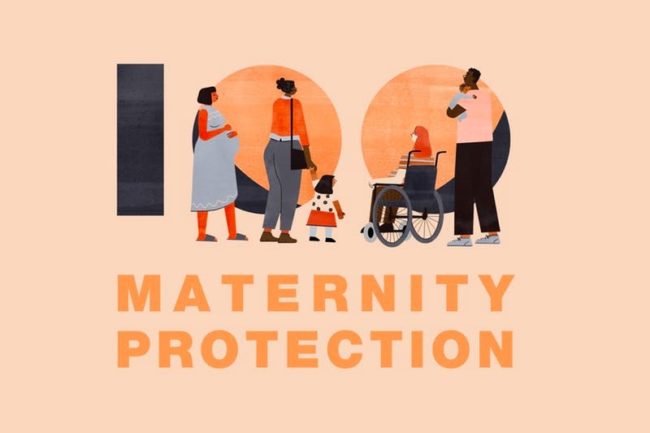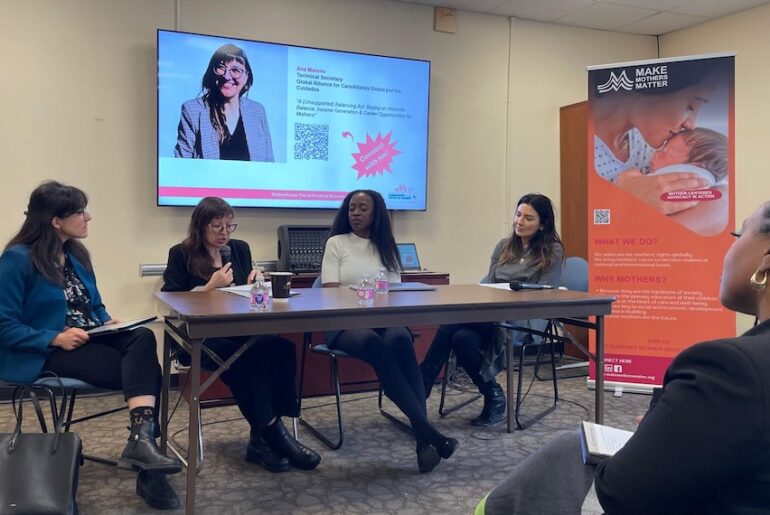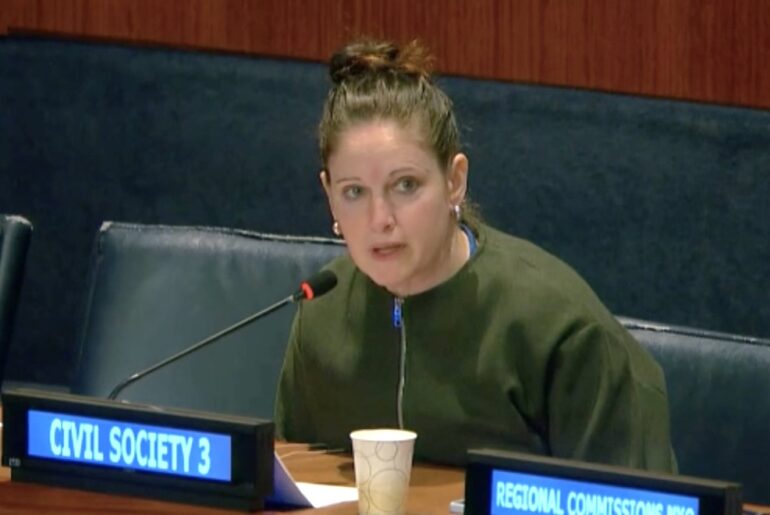Beyond Maternity Protection: Mothers need more than just leave policies
11.11.19
UN Geneva - MMM took part in an event organized on 8 November by the International Labour Organisation (ILO) on the occasion of the 100th anniversary of Maternity Protection: "A Century of maternity protection: Transforming leave and care policies for a better future of work for all".

100 years of Maternity Protection
The Maternity Protection Convention (no 3) was among the first conventions that the ILO adopted at its initial International Labour Conference in 1919, recognizing the right to paid leave in relation to childbirth with employment protection. Since then, the scope of maternity protection and benefits has expanded as reflected in a new Maternity Protection convention adopted in 2000 (No. 183).
The aim of Maternity Protection is two-fold:
- to preserve the health of the mother and her newborn
- to provide a measure of job and income security (through protection from dismissal and discrimination, the right to resume work after leave, and maintenance of wages and incomes during maternity… )
Most countries have now adopted maternity protection legislation. And over the last 20 years, there have been improvements in terms of leave duration, and the introduction of funding systems of paid maternity leave based on social security instead of employer liability.
However, only 44.9% of women with newborns receive maternity cash benefits that provide them with income security around childbirth. In particular, for women working in the informal sector, which is the case for the majority of women in most developing countries, maternity protection remains elusive.
This is a serious gap that must be addressed: Maternity Protection is absolutely crucial for women’s economic and social rights around childbirth, as well as her future career prospects.
And as the ILO Director-General reminded in his opening speech, “It is also good for companies – by supporting maternity leave they are investing in the retention of their staff. To put it in other words, maternity protection is good for societies and it is good for economies as a whole.”
From maternity protection to parenthood protection and support?
However, the return to work after maternity leave is not the end – on the contrary – it is the beginning of the journey of motherhood.
What about “Motherhood protection”? Or rather “Parenthood protection and support”, i.e. a package of measures that support women and men in their different roles, and that foster more equity in both the private and public spheres.
Paternity and parental leaves are absolutely essential and must be an integral part of such a package. But, no matter how transformative they may be labeled, they are simply not enough. They must also be part of a much broader policy/package of measures – one that encompasses multiple sectors beyond the Labour and Health Sectors.
A “Parenthood protection and support” package should, in particular, include measures to:
- Facilitate women’s re-entry into the workforce after maternity or parental leave – through training, but also, by recognizing the skills that one acquires through the work of caring (like organisational or interpersonal skills, or even management skills)
- Support parents’ challenge of balancing their caring and educative responsibilities with a career – with, for example, non-discriminatory flexible working arrangements and quality part-time work
- Protect from all kinds of discriminations linked to motherhood – e.g. at hiring, in promotion, in pay (we know that the Gender Pay Gap is larger for mothers than for women without children)
- Promote a more equitable distribution of unpaid family care work and responsibilities – first between men and women, but also between families and Society
- “Care for the carers”, through health and social services that above all target vulnerable families, like single-parent families, and that recognize and address maternal mental health issues and parental burnout
- Empower parents for the challenging but essential job of raising the next generation – the future workforce – E.g. through parental education on child development and on the importance of responsive caregiving and positive parenting, especially during the early years.
The European Work-Life Balance Directive, which was adopted earlier this year, and which we at MMM campaigned hard for, is a first step in this direction. It could go much further and we intend to continue our advocacy work at the EU to build on this Directive.
In fact, we need systemic transformations and a paradigm shift where
- Care, education and the wellbeing of people and the planet are at the centre of government priorities and policies
- Governments move away from short-termism, take a long-term perspective and invest in the future, in children and families, in people and in their capabilities.
We at MMM firmly believe that it is time for the world of work to adapt to people and families, and that the economy serves the wellbeing of people and the planet – not the other way around.
Article updated in 2024 with the latest data on maternity cash benefit from the ILO’s World Social Protection Report 2020-22
Time Poverty and the Motherhood Penalty
Unveiling Economic and Social Injustices
09.07.24
Mothers play an essential role in families by ensuring their loved ones are nourished, educated, and healthy, but their unpaid care work often leads to economic and social injustices, known
Envisioning care as a common thread to global crises
29.07.24
UN New York - Our virtual HLPF side-event brought together experts to shed light on how the various global crises we face (in particular climate change and other environmental crises,
We call for multi-stakeholder approach to recognise and support unpaid care work
21.07.24
UN New York - Participating in the meeting of the UN Economic and Social Council (ECOSOC) on care and support systems, MMM reaffirmed the principle of co-responsibility, which should underpin








